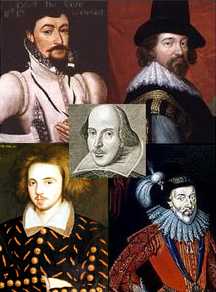Charlton Ogburn
Charlton Ogburn, Jr. (15 March 1911, Atlanta, Georgia – 19 October 1998, Beaufort, South Carolina) was a journalist and author of memoirs and non-fiction works. He was also a well-known advocate of the Oxfordian theory of Shakespeare authorship. He wrote over a dozen books and numerous magazine articles.
Life
Ogburn was the son of lawyer Charlton Greenwood Ogburn and writer Dorothy Ogburn née Stevens. His uncle was the sociologist William Fielding Ogburn. He was raised in Savannah and New York, graduated from Harvard in 1932 and wrote and worked in publishing. During World War II he joined military intelligence, leaving with the rank of captain. He returned to the US to begin a career with the State Department. He married Vera M. Weidman in 1951.
After the success of his story "Merrill's Marauders", a Harper's Magazine cover story in 1957, Harper & Bros. offered an advance for a book and he quit the government to write full-time in 1957.[1]
He was among the first State Department officials to explicitly oppose the growing U.S. involvement in the Vietnam war.[2]
Ogburn's papers are archived at Emory University.[3]
Works
The Marauders
For most of Ogburn's life, his best-known work was The Marauders (1959), a first person account of the Burma Campaign in World War II. It was later filmed as Merrill's Marauders (1962).
Versions of the following quotation are frequently mis-attributed to Petronius.
- We trained hard ... but it seemed that every time we were beginning to form up into teams we would be reorganized. I was to learn later in life that we tend to meet any new situation by reorganizing; and a wonderful method it can be for creating the illusion of progress while producing confusion, inefficiency, and demoralization.
In fact it is from the magazine article "Merrill's Marauders" (Harper's Magazine, 1957) that earned Ogburn his book contract. In full, it reads thus:
- We trained hard, but it seemed that every time we were beginning to form up into teams we would be reorganised. Presumably the plans for our employment were being changed. I was to learn later in life that, perhaps because we are so good at organising, we tend as a nation to meet any new situation by reorganising; and a wonderful method it can be for creating the illusion of progress while producing confusion, inefficiency and demoralization.
The Winter Beach
Ogburn won the John Burroughs award in 1967 for The Winter Beach. His account of travels along the largely deserted northeastern shore is considered a classic of nature-writing. Roger Tory Peterson wrote, "In The Winter Beach, literary courage, eloquence and wisdom have, I think, brought about a triumph." (Stewart Udall) "Ogburn has written a most extraordinary book ... he is a very sensitive, reflective writer in the Thoreauvian tradition."
Oxfordian theory
Today Ogburn may be known best for several books and articles on the Shakespeare authorship question, continuing the passion of his parents, who had written several books on the topic including This Star of England: "William Shakes-speare" Man of the Renaissance (Coward-McCann, 1952). Ogburn junior's last and most well-known book, The Mysterious William Shakespeare: The Man and the Myth (1984), led directly to an appearance on William F. Buckley's "Firing Line", a 1987 Frontline documentary on the authorship question, narrated by Al Austin, and mock trials in America and Britain.[1] More than a thousand people attended the moot court case sponsored by American University in 1987. Three US Supreme Court justices —John Paul Stevens, Harry Blackmun, and William J. Brennan— heard arguments in favor of the orthodox view of Shakespearean authorship and the Oxfordian theory that attributes the works to Edward de Vere, 17th Earl of Oxford (1550–1604). Although the justices held in favor of the traditional account of authorship, Justice Stevens later wrote an article supporting Ogburn's position, "The Shakespeare Canon of Statutory Construction", University of Pennsylvania Law Review (1991).
Ogburn's book reinvigorated the Oxfordian theory; inspired a succession of articles in The New Yorker (1988), Atlantic Monthly (1991), and Harper's Magazine (1999); and provoked a nationally broadcast, three-hour teleconference on the topic, Uncovering Shakespeare: An Update, with moderator William F. Buckley, Jr..
See also
- Colonel Charles N. Hunter author of Galahad (San Antonio, TX: Naylor Co., 1963), a book about Merrill's Marauders and the commanding officer frequently mentioned in Ogburn's book, The Marauders.
References
- ↑ 1.0 1.1 "Charlton Ogburn 1911 – 1998". The Ogbourne Chronicles: Historical and Genealogical Information .... Retrieved 2012-01-12.
- ↑ Mark Atwood Lawrence and Fredrik Logevall, The first Vietnam War: Colonial Conflict and Cold War Crisis, Harvard University Press, 2007, p. 342. The authors call "prescient" Ogburn's early critique of the assumptions guiding U.S. policy.
- ↑
| Wikiquote has a collection of quotations related to: Charlton Ogburn |
| |||||||||||||||||
|
